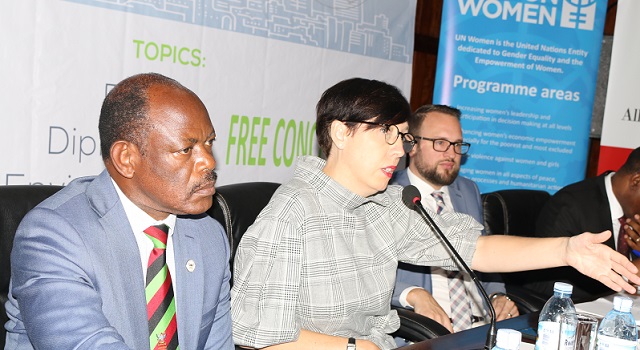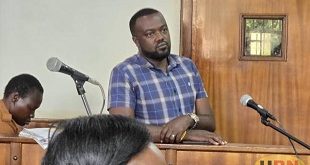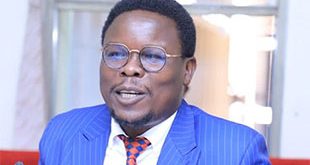
Over the last two decades we have seen the French Development Agency (AFD) almost triple funding for development projects in Uganda to about € 1bn. What has made France sink so much in these projects?
I was lucky when I got here to find a very good AFD country representative in Virginie Leroy. She really focused on Uganda and she managed to push for more and more projects because they were well-structured and were also answering Uganda’s development needs. The quality of the relationship she had with the Ministries of Finance, Water and Environment, Energy and Transport made it easier for her to present these good projects to AFD. But also France’s strategic focus has been shifting towards eastern Africa.
What have been some of the achievements from the military collaboration between France and Uganda in the fight against terrorism in eastern Africa?
Well, I am very happy that there has not been a terrorist attack in Uganda since 2010. I think that is proof that our collaboration between Uganda; us and many other partners, is working. I believe the collaboration against the Al Shabaab threat in Somalia has been effective and I think it has been beneficial for both countries.
What were some of your frustrations and disappointments during your stay?
I am a bit concerned about the evolution of the business terms here. I would have wanted these terms to be friendlier to benefit the Ugandan economy but it does not seem to go in that direction. There is a lot of uncertainty on project decisions, especially the oil project. The business climate needs to be very much on the (government’s) agenda so that foreign businesses can feel welcome here. There is also an element of corruption here. I think Uganda has to understand that businesses have options elsewhere. It is a competition and if the environment is unstable, uncertain and unpredictable, investors dislike that.
What’s your comment about the endless diplomatic spats between Uganda and Rwanda and how do you suggest these two neighbours resolve their disagreements?
When you look at the feud that is going on right now, we can only be sad because it is having negative results for both countries. There are lots of rumours at the moment and it is very hard to get to know what is true, but, I cannot believe fundamentally that there could be a will to destabilize each other because looking at what Presidents Museveni and Kagame have said about regional integration, it is in their interests to resolve this. A French philosopher (Montesquieu) once said that when two countries meet, they can either fight and they both lose or they can trade together and they both win. This is the situation here. We are hoping the situation will not deteriorate further.
What will you remember most about Uganda?
The people are number one and then the countryside— the wildlife and nature. I am someone who wants to live my life to the fullest and for that I need to have many experiences; I need to go in many places and meet many people as much as possible so that when I die or when I look back in my old years I can say, “Oh my God I have done so much. I visited many places and I got in contact with so many cultures and I can die in peace.”
Where are you headed next?
I have been appointed General Secretary of the France-Africa Summit which will take place in Paris in June, next year.We shall invite the 54 Heads of State of the entire African continent.The theme is “Sustainable Cities” and it is very relevant. The cities right now are much larger with a bunch of issues—pollution, congestion, slums, electricity and jobs. I would like this summit not to be about the Heads of State only because they cannot do everything when it comes to cities.The mayors are extremely important, the ministries, the private sector and the people or the citizens of the city as well. So I will invite a wide range of people to come to France to lay on the table their concerns and solutions as citizens, politicians or the private sector.
****
 The Independent Uganda: You get the Truth we Pay the Price
The Independent Uganda: You get the Truth we Pay the Price




” A French philosopher (Montesquieu) once said that when two countries meet, they can either fight and they both lose or they can trade together and they both win.” I HOPE TO GOD KAGAME AND MUSEVENI BUT MOSTLY MUSEVENI.
Where is the relations between the title of the aricke and its content? I do not see it
You are right. I looked, and looked and looked to no avail. Misleading article.
True. Not related at all
It’s on the second page, towards the end of the article.
Maybe I’m missing something here. What has France got to do with Uganda-Rwanda relations? Why would anyone seek comment from an outgoing French ambassador to Uganda on such a matter, especially considering the unpretty history of France’s relationship with Kagame? Okay, she sounds well-meaning, but who is she that her opinion on this sensitive issue should be sought and publicized? Personally, I think that what African leaders and ambassadors are saying would be more relevant and insightful, especially since that’s the direction being taken by those actively seeking solutions to the current situation. Anyway, we remain hopeful that whatever is not helping us move forward as a region will be resolved by African leadership. Is that hoping too much? We shall see.
Focus should be placed on the ambassador’s strong points in her analysis. For instance, “Kenya is more mature in business, but Uganda positions herself to attract foreign investment”. This is a strong point that should generate debate. What has contributed to Kenya’s maturing in business? When South Sudan emerged as a serious market in the region, Kenya went there to provide services like banking, transport, Insurance and the like. Uganda mostly provided security services for the Kenyan businesses. This was also good as security in the region is paramount, strategically I think we behind Kenya. We need to be thinking broadly. We should be nurturing companies that can seize business opportunities out there to expand our economic influence in the region.